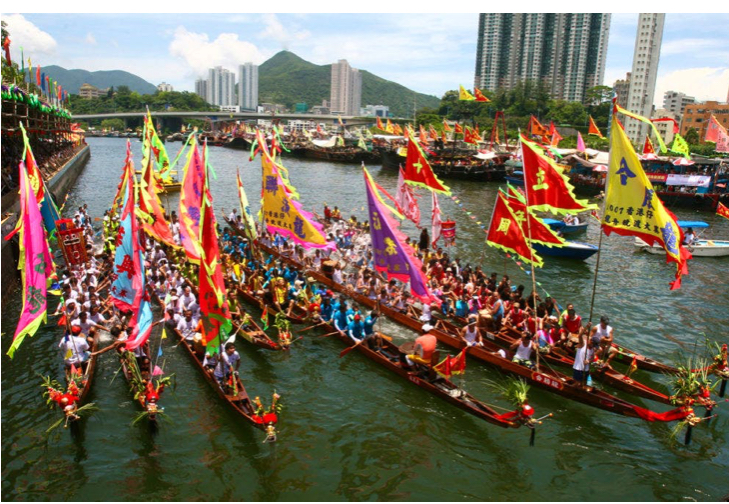By Gerald Mbanda

The Dragon Boat Festival, known as Duanwu Jie (端午节) will be celebrated on May 31 this year, and it is a popular annual event within the Chinese cilture.
While it is widely recognized for its vibrant dragon boat races and the consumption of zongzi (sticky rice dumplings), the festival’s significance extends far beyond these traditions. Rooted in ancient customs, the Dragon Boat Festival embodies themes of patriotism, community unity, health, and environmental harmony, reflecting China’s rich cultural tapestry.
The festival’s origins are multifaceted, intertwining historical events and agricultural practices. One prominent legend attributes the festival to the commemoration of Qu Yuan, a revered poet and statesman of the Warring States period. Devastated by his country’s corruption and subsequent invasion, QuYuan drowned himself in the Miluo River. Local villagers, in an effort to protect his body from fish and water spirits, raced in boats to retrieve him and threw rice into the water to feed the creatures, thus giving rise to dragon boat racing and the tradition of zongzi.
Beyond this narrative, the timing of the festival coincides with the summer solstice, a period historically associated with the need to ward off evil spirits and diseases. The use of aromatic herbs, such as mugwort and calamus, and the hanging of pouches filled with these plants over doorways are practices believed to offer protection and promote health during this time.
The Dragon Boat Festival serves as a vital occasion for fostering community spirit and social cohesion. In many regions, dragon boat races are organized as team events, often involving local communities, schools, and organizations. These races not only celebrate athleticism but also encourage teamwork, discipline, and a sense of collective identity.
In some places, nighttime dragon boat races, illuminated by LED lights, have become a popular attraction, allowing participants and spectators to enjoy the festivities while avoiding the intense daytime heat. Such adaptations demonstrate the festival’s ability to evolve while retaining its core values of unity and cultural pride.
Health and wellness are central themes of the Dragon Boat Festival. The consumption of zongzi, made from glutinous rice and various fillings wrapped in bamboo leaves, is a culinary highlight. These dumplings are not only a treat but also a symbol of the community’s efforts to protect Qu Yuan’s body, as the rice was intended to prevent fish from consuming it.
Additionally, the practice of bathing in flower-scented water is believed to cleanse the body and repel evil spirits. This tradition underscores the festival’s emphasis on physical well-being and spiritual purification, aligning with ancient beliefs in the connection between health and the natural world.
The Dragon Boat Festival also reflects themes of environmental harmony and sustainability. The use of natural materials in the construction of dragon boats and the wrapping of zongzi in biodegradable leaves highlight a traditional respect for nature. Moreover, the festival’s association with water bodies emphasizes the importance of clean and preserved aquatic environments, aligning with contemporary global concerns about ecological conservation.
In recent years, there has been a concerted effort to promote sustainable practices during the festival. Initiatives include reducing plastic waste, encouraging the use of reusable materials, and educating the public about the environmental impact of their celebrations. These efforts demonstrate a commitment to preserving the natural heritage that the festival honors.
The influence of the Dragon Boat Festival extends beyond China, with celebrations occurring in various countries around the world. In Vancouver, Canada, the Concord Pacific Dragon Boat Festival attracts over 200 crews from around the globe, promoting intercultural understanding and community engagement. Similarly, cities like New York, San Francisco, and London host dragon boat races that bring together diverse populations to celebrate this shared cultural heritage.African countries especially South Africa have also embraced the festival and it is gaining popularity.
These international festivals not only showcase the sport of dragon boat racing but also serve as platforms for cultural exchange, allowing participants and spectators to experience Chinese traditions and values firsthand. The global reach of the Dragon Boat Festival underscores its universal appeal and the enduring relevance of its cultural messages.
The Chinese Dragon Boat Festival is more than a cultural celebration; it is a multifaceted event that embodies themes of patriotism, community unity, health, environmental harmony, and cultural exchange. Rooted in ancient traditions yet adaptable to modern contexts, the festival continues to inspire and connect people worldwide. As it evolves, the Dragon Boat Festival remains a testament to the enduring power of cultural heritage in fostering understanding and unity across diverse societies.
 Africa -China Review Africa -China Cooperation and Transformation
Africa -China Review Africa -China Cooperation and Transformation
